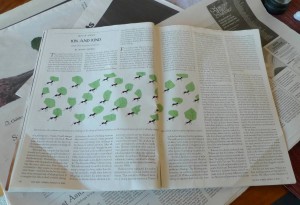I’ve had a very ambivalent relationship to submitting poetry to magazines for publication. I don’t read small literary magazines, so why submit to them? And if you pay the reading fee to enter a contest, they just pile up unread on the shelf, an unpleasant reminder of the problems of publication.
 On the other hand, a friend recently had a poem of his published in the New Yorker, which I do read, and said he simply submitted it online. Of course, he studied with the current poetry editor, so that helps. But I decided to submit one.
On the other hand, a friend recently had a poem of his published in the New Yorker, which I do read, and said he simply submitted it online. Of course, he studied with the current poetry editor, so that helps. But I decided to submit one.
The online submission page said something like “due to the volume of submissions, it may take three or four months for us to respond.” However, I received a rejection note the very next day. I guess they really didn’t like it. But undaunted, I am printing it here.
In Praise of Research
Here’s to the researcher’s neck arched over his microscope
with the single-mindedness of a horse bent to its oats
hour after year in the bright box of the lab
decoding the origin of a sub-family of mosquito
that only lives sealed in the London underground.
Or Marie Curie burning her hands over and over
in the luminous blue-green glow of the radium
she extracted before anyone knew it was there
or what it could do.
Or the scholar holed up in the library carrel
working on the meaning of the “the.”
Quinine, x-rays, meaning itself, the way the world
is constructed of waves and particles and a something else
we can’t agree on, that time stretches and light bends,
and like horses in traces
impelled by the will of our kind
we bend our necks to it
as hungry for knowledge
as for grain from a loving hand.
* * *
I hope you like it better than the editors at the New Yorker. I think I’ll just keep sending them poems. Like Sylvia Plath, I could create wallpaper with rejection slips.
 I reviewed Forrest Gander’s recent book,
I reviewed Forrest Gander’s recent book, 



